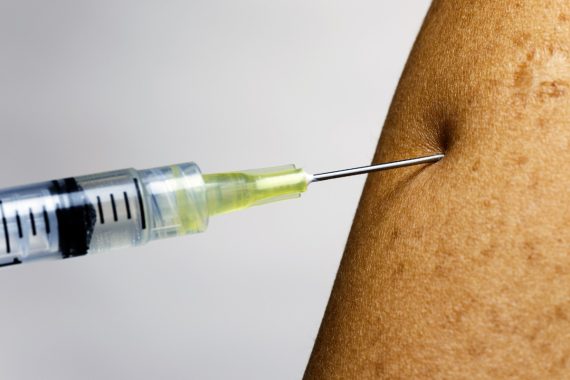There is ‘no immediate need’ to introduce a second booster dose, the Joint Committee on Vaccination and Immunisation (JCVI) has said.
The recommendation follows data published by the UK Health Security Agency (UKHSA) that shows protection against hospitalisation among the over-65s remains at around 90% three months after a third vaccine dose.
The JCVI said that while there is no current need to begin administering further doses, the ‘timing and need’ for additional shots will continue to be reviewed.
Priority should continue to be given to rolling out first doses and booster vaccines to all age groups, it added.
Professor Wei Shen Lim, the JCVI’s chair of Covid-19 immunisation, said: ‘The current data shows the booster dose is continuing to provide high levels of protection against severe disease, even for the most vulnerable older age groups.
‘For this reason, the committee has concluded there is no immediate need to introduce a second booster dose, though this will continue to be reviewed.’
He added that the data is ‘highly encouraging and emphasises the value’ of the booster dose.
In its data analysis on the effectiveness of three Covid shots, UKHSA noted that protection against severe disease drops to around 70% after three months and to 50% after six months with only two vaccine doses.
After a booster dose, protection against mild symptomatic infection can drop to around 30% after around three months.
UKHSA clarified that further doses of the vaccine are still ‘being considered’.
The JCVI’s review considered that:
-
the booster programme is still providing ‘very good’ protection against severe disease, including in older adults
-
an immediate second booster dose in the most vulnerable would ‘provide only limited additional benefit against severe disease at this time’
-
an immediate second booster programme would ‘add to the significant existing operational pressures’ for the rest of the Covid vaccine programme and other health services
-
the current Omicron wave is progressing ‘very swiftly’, offering ‘limited time for additional vaccine programme measures to have a substantial impact’
-
the main aim of the programme remains prevention of severe disease, while protection against mild or asymptomatic infection with existing vaccines would require ‘regular (perhaps as frequent as three monthly) booster vaccinations which is not considered a sustainable long-term strategy’
-
alternative vaccines, including variant specific vaccines, may become available during 2022 and may be better suited to providing long-term protection against the Omicron variant or other novel variants
Source: JCVI statement
It comes as practices are working through the Covid vaccine booster campaign, which has now seen more than 35.4 million doses administered.
However, it also comes as the UK has recorded more than 150,000 Covid-related deaths since the start of the pandemic.
Responding to the news on Saturday, BMA council chair Dr Chaand Nagpaul said: ‘Today marks a sombre and deeply tragic milestone in our fight against this devastating virus. Each of the 150,000 who have died have left loved ones and friends behind, and our thoughts and sympathies go out to them for their loss.
‘This figure is a stark reminder that Covid-19 remains serious and deadly and means that in less than a year the UK has seen another 50,000 deaths from the virus – it was only on 26 January 2021 that we mourned the loss of 100,000 people.’
He added: ‘The vaccination programme has made a huge difference in reducing deaths from Covid. Everything possible needs to be done to make sure everyone who is eligible is vaccinated, including with the booster which is needed to protect against Omicron.
‘In the meantime, Government must do all it can to get control of Omicron with immediate public health measures, not only to protect the health service, but also more people from unnecessarily losing their lives.’
Last week, the chief scientific officer suggested that the long-term Covid vaccination strategy could be an annual jab similar to the flu programme.
Meanwhile, the Government has announced that it met its target for all eligible over-18s in England to be offered a Covid booster by 31 December, with more than three-quarters of eligible adults receiving their Covid booster jab before New Year’s Eve.
A version of this article was first published by Pulse’s sister title Management in Practice
Additional reporting by Costanza Potter
Pulse July survey
Take our July 2025 survey to potentially win £1.000 worth of tokens















This seems a bit selective in it’s statistics quotes.
How many people in GB have had their first booster dose more than 6 months ago?
And what is their relative risk compared to similar people with similar exposure risk, who have had it more recently?
Noting that those most likely to have had booster more than 6 months ago are those mosyt likely to be at higher risk of exposure because they are living or working in healthcare settings!
How is the decision different to that in Isreal, where bossting 4-monthly has been advised, despite their higher vitaminD levels deu to the extra sunshine?